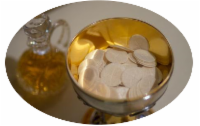Homily for The Most Holy Body and Blood, by Msgr. Jameson
"Imagine that you are standing at the edge of a pond.
Instinctively, you pick up a pebble, stone, or even a rock and throw it into the center of the pond. Immediately, the water begins to form rings that start out small and get larger until they fall out of sight.
This image can be used to appreciate how the Eucharist should inspire us to share its fruits with others.Christ is the center within each of us who then should influence all we meet in an ever increasing ring of inspiration. Like a ripple, we should silently reach out to the ends of the earth.
As we see in our first reading, God fed the Israelites for their journey. Moses reminded the Israelites that their wandering through the desert was a test of faith. God fed them with manna, the bread from heaven, when they were hungry. The instructions on how to gather the bread each day were given as a test to see if the Israelites would be faithful, if they would trust the Lord to daily address their cares. That kind of trust was necessary for them to successfully enter the Promised Land.
 The Eucharist is our food for the journey. We need the spiritual food of the Eucharist to successfully complete our life journey. We need to trust in the Lord’s care for us in our spiritual hunger. But we are not to be self-centered regarding this food. It is given to strengthen us so that we, in turn, can reach out to others in their needs
The Eucharist is our food for the journey. We need the spiritual food of the Eucharist to successfully complete our life journey. We need to trust in the Lord’s care for us in our spiritual hunger. But we are not to be self-centered regarding this food. It is given to strengthen us so that we, in turn, can reach out to others in their needs
Jesus’ body and blood are real food and drink. Just as everyday food and drink strengthens our bodies for life’s tasks, so the body and blood of the Lord strengthen and nourish our spirits. Eating the Lord’s body and drinking his blood also unites us with the Lord and makes us one with him and with one another. It is this added dimension, our union with Jesus and with his community, that leads us to reach out to others. The body and blood of the Lord, then, are both food for our spirits and source of strength for our Christian life for others.
This is really about the social dimension of this feast day. While receiving the Eucharist is beneficial to ourselves, we are called to be missionaries to the world. The effects of the Eucharist are to be shared, not hoarded. This, then, is a feast of appreciation for the gift, as well as a challenge to share the gift with the world. And God is with us to make it possible.
We fulfill that challenge by what we say and do. If we believe in the unity that the body and blood of Jesus make present, we must reflect the Lord in our words and actions. Our words are to build up community and mutual relationships, and never to tear them down. Our actions are to show respect and acceptance of others, regardless of sex, race, or creed. We are to be Christ to and for one another. I think we saw this situation very clearly this past week. We were all reminded of the evils of racism. We were forced to wake up to the fact that all of us are created equal. And we must protect the dignity of each and every human being.
When I first came to the Cathedral in my first life, I ministered here with a young priest named Sean O’Malley. We saw first hand the need to build up the one community, a community where we really accepted one another as brothers and sisters. This same Sean O’Malley recently had this to say about racism and its impact on community:
Like COVID-19, racism can infect any person, without regard to region, religion, race or ethnicity. It is highly contagious, easily transmitted to others, and too often unseen and disguised in those seemingly healthy. Racism is a social and spiritual disease that kills people.
As we gather for this Eucharist, we renew the gift of Jesus as food and drink for the world, and accept the challenge to reach out to others in service. Jesus is present to make that possible.